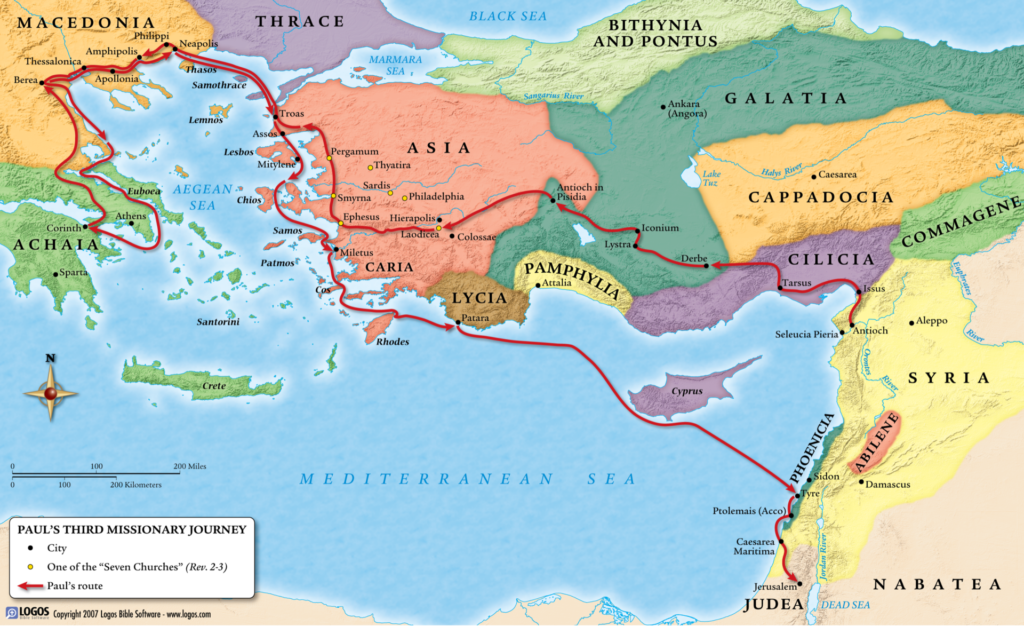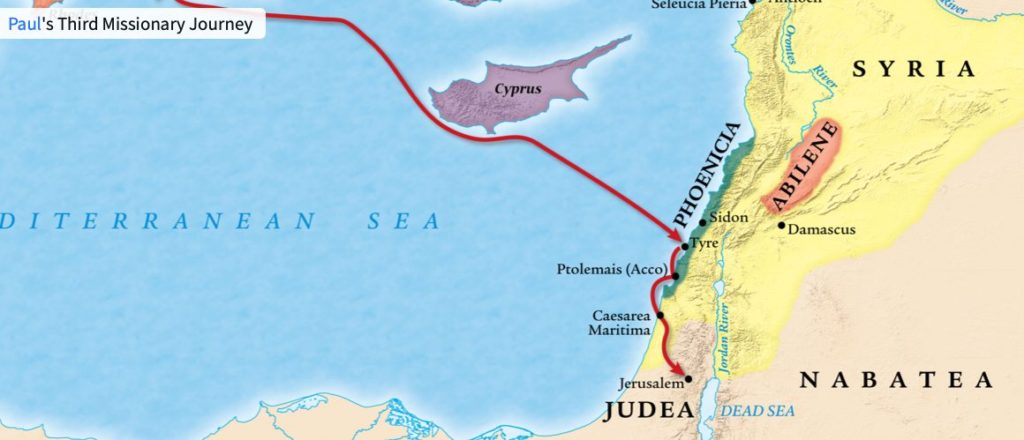LISTEN
WATCH
READ
Nate Roten / Acts Series / Acts 21:1–14
Main Idea
Understand the cost of obedience and rightly discern God’s will even when other faithful believers don’t.
Samples from scripture
- Abraham’s faith waiting for Isaac.
- Job’s faith stands tall among bad advice.
Question to the congregation: Have you ever experienced a word from the Lord that didn’t come to pass until years later, or that you knew what God was directing you toward, even though your friends and family thought you were nuts? Put yourself back in that situation. Remember the uncertainty, frustration, heartache, or maybe even peace in the turmoil. Doing so will help you connect with what Paul is experiencing and will experience in the story today.
In times like these, it can feel as though you are standing in front of a thick wall of fog, and you know God is telling you to walk into it, even though you can’t see what is on the other side.
Restate two verses from last week:
Acts 20:22–23 ESV
And now, behold, I am going to Jerusalem, constrained by the Spirit, not knowing what will happen to me there, except that the Holy Spirit testifies to me in every city that imprisonment and afflictions await me.
Acts 20:24 ESV
But I do not account my life of any value nor as precious to myself, if only I may finish my course and the ministry that I received from the Lord Jesus, to testify to the gospel of the grace of God.
Now, with that context, let’s read today’s passage.
Passage
Acts 21:1–14 ESV
And when we had parted from them and set sail, we came by a straight course to Cos, and the next day to Rhodes, and from there to Patara. And having found a ship crossing to Phoenicia, we went aboard and set sail. When we had come in sight of Cyprus, leaving it on the left we sailed to Syria and landed at Tyre, for there the ship was to unload its cargo. And having sought out the disciples, we stayed there for seven days. And through the Spirit they were telling Paul not to go on to Jerusalem. When our days there were ended, we departed and went on our journey, and they all, with wives and children, accompanied us until we were outside the city. And kneeling down on the beach, we prayed and said farewell to one another. Then we went on board the ship, and they returned home.
When we had finished the voyage from Tyre, we arrived at Ptolemais, and we greeted the brothers and stayed with them for one day. On the next day we departed and came to Caesarea, and we entered the house of Philip the evangelist, who was one of the seven, and stayed with him. He had four unmarried daughters, who prophesied. While we were staying for many days, a prophet named Agabus came down from Judea. And coming to us, he took Paul’s belt and bound his own feet and hands and said, “Thus says the Holy Spirit, ‘This is how the Jews at Jerusalem will bind the man who owns this belt and deliver him into the hands of the Gentiles.’ ” When we heard this, we and the people there urged him not to go up to Jerusalem. Then Paul answered, “What are you doing, weeping and breaking my heart? For I am ready not only to be imprisoned but even to die in Jerusalem for the name of the Lord Jesus.” And since he would not be persuaded, we ceased and said, “Let the will of the Lord be done.”
Outline
I – The church in Tyre
II – The church in Caesarea
I – The church in Tyre
Routing

- Cos to Rhodes to Patara – all one-day trips from port to port.
- Patara to (past Cyprus) Tyre (in Syria/Phoenicia) was a 400-mile journey of up to 5 days.
Paul and Co. stayed in Tyre for seven days, assumably because of the time required to unload the ship and re-stock with new cargo. Tyre was an ancient port city and trade center and had deeply biblical roots.
Not wanting to waste an entire week, Paul and Co. set off to find and fellowship with the local believers, who were likely established after the evangelical outreach to the region mentioned in Acts 11:19.
The word from the disciples
Through the Spirit, they told Paul not to go to Jerusalem.
This seems to be the opposite of what the Spirit told Paul from city to city. Is this a discrepancy? Did the Spirit tell Paul one thing and these believers another? Do opposers to Christianity have a case by saying this is a contradiction?
No. The Spirit cannot contradict Himself. He is perfect and incapable of doing so.
So, what is happening, then? They did hear rightly from the Spirit that affliction and imprisonment await. That is what He has said to Paul. That is what He said to the believers in Tyre. That is what He will say to Agabus. His message is consistent. The difference comes with what they did with that information. They took it as a warning for Paul to stay away because they loved Paul and didn’t want him to suffer that fate! Would any of us want to see a loved one wrongfully imprisoned and beaten? Wouldn’t our knee-jerk reaction be to protect the ones we love?
They heard rightly but interpreted wrongly. Unfortunately, we are fallible. We aren’t like the OT Prophets who speak 100% accurately on God’s behalf. We can misunderstand. That is why we need to seek His will and not assume we understand fully as soon as we hear something. It is also a call to remain steadfast in your conviction when you know God has told you something. Sometimes, the cost of obedience to God is the sting of pain as you reject passionate pleas from those close to you, tempted to go against what God has said.
The farewell
This didn’t create division, however. The believers of Tyre may not have understood Paul’s resolution, but they didn’t let that destroy their fellowship. They may have been well-informed but ill-advisors, but even then, they had disagreement without division.
How do we know that?
After the seven days were over, not only did the core group of believers travel with him to the ship, but their wives and children also came! It was a whole family affair! They all wanted to give Paul a proper and loving send-off by gathering everyone together and kneeling to pray for him and his associates.
Though they had only been together a week, they bonded with Paul in ways similar to the Ephesian Elders. This was an emotional farewell.
Our pain can be a witness to God’s glory and a catalyst for Christian unity. Our fidelity to God’s call can inspire many, and our strength in times like these can make others strong.
Now boarded, Paul and Co. continue the trek toward Jerusalem.
II – The church in Caesarea
Routing

Tyre to Ptolemais, where they sought out Christian fellowship during their 24-hour stay.
Ptolemais to Caesarea.
Caesarea is the closest port city to Jerusalem and is mentioned many times in the Book of Acts. This is where Cornelius lived, where Herod gave his egotistical speech, worshiped as a god, and was struck down by an angel of the Lord, and Philip settled down.
Philip and Co.
Philip was chosen in Acts 6 alongside Stephen as one of the seven faithful and trustworthy (1.0 version of) Deacons. After Stephen’s murder and subsequent Christian persecution, Philip and many others fled Jerusalem.
The last time we saw Philip was after the explosion of converts in Samaria and the baptism of the Ethiopian Eunuch. Once this happened, Philip was supernaturally carried away to Azotus and then to Caesarea.

Here, he continued earning the evangelist title and building a family. This is the first mention of his children: four virgin daughters who prophesied. We can discuss later whether or not the gift of prophecy is still active today, 2,000 years later, but it was clearly in operation at this time. This was still a clear sign of God pouring out His Spirit as it was prophesied in Joel 2:28-29 and as was realized in Acts chapter two at Pentecost.
Joel 2:28–29 ESV
“And it shall come to pass afterward, that I will pour out my Spirit on all flesh; your sons and your daughters shall prophesy, your old men shall dream dreams, and your young men shall see visions. Even on the male and female servants in those days I will pour out my Spirit.
And that is all we are told. We don’t have the content of their prophetic utterances or reunion details. We are just told they spent time together. But, looking at the broader theme of the passage, we can safely assume that they also had a word from the Spirit about Paul’s pending fate, and was likely meant to inform and encourage him as another instance where the Spirit was telling him what was to come from city to city. Prophesying God’s will is the central theme of the passage. The Spirit told Paul from city to city what would happen; the believers in Tyre heard the same thing, and our next guest will also speak the same thing. So, Luke gives another instance where the Lord is speaking through His people to confirm His plans.
Still, to this point, the Spirit has remained relatively vague about the details. Imagine what it must have been like for Paul – knowing that danger, affliction, and imprisonment were coming but not knowing precisely what it all meant. He, too, was staring into a thick wall of fog, being told by God to move forward but unable to see what lay ahead. Can you relate? Do you feel Paul’s anxiousness? Or maybe you see an instance where he could live in the peace of Christ and not be anxious for anything, but by prayer, supplication, and thanksgiving, make his requests known to God. Maybe you can see his resolve and trust.
Agabus

Next, we see Agabus, whom we’ve seen before. We met him in Acts 11 in Antioch when he predicted a severe famine that would affect the entire Roman Empire. And that came to pass. This man has been proven trustworthy, and many in the church clearly wanted to hear from him. He came from the region of Judea to meet with Paul and Co.
And this is where the ambiguity clears out, the fog will lift somewhat, and his trustworthiness will again prove reliable.
Agabus walks up to Paul, unties his belt, and then proceeds to tie up his hands and feet. So, assumably, he is still there, tied up, then looks up at Paul and declares that this will happen to the belt owner in Jerusalem.
“Thus says the Holy Spirit,” he declares. This is clearly not his own interpretation. The Jews will bind this man (Paul) and deliver him over to the Gentiles for what we can assume are unsavory purposes.
There really is no way to misinterpret what he is saying. Notice what he doesn’t say. Agabus doesn’t say that the Spirit says this will happen; therefore, do not go. He simply states what will happen to the belt’s owner upon arrival in Jerusalem. He heard and declared rightly. Essentially, he provided a visual aid and said this would happen. Thus says the Lord.
The believer’s response
It was the rest of the group, not Agabus, who begged Paul not to go. Like the church in Tyre, the church in Caesarea loved Paul and didn’t want to see him arrested, beaten, or worse. And this time, because of the ‘we’ pronoun, Luke is joining in! It’s not that they are mishandling prophecy. They are demonstrating loving care and concern for their brother in Christ.
But, even with good intentions, this shows us that we must be careful what voices we listen to and who we surround ourselves with. Every believer in this story was well-intentioned, but they reacted from their own will, not God’s will. Had they been careful to seek and listen, they would have held their tongues because this was crushing Paul’s soul.
Just look at his response!
Paul’s pushback

You’re killing me, smalls! Okay, not exactly, but they were breaking his heart with their constant pleas. He knew their hearts. He knew it was coming from a good place, but time after time, he had to reject the advice of the ones he loved and correct their understanding of God’s will.
Paul knew the cost of obedience, and even though he had to say it through tears, he reminded them once more about what the Spirit was really saying and just how far he was willing to go to obey.
“I am ready not only to be imprisoned but even to die in Jerusalem for the name of the Lord Jesus.”
I’m not going to be a prisoner of Rome because I am already a prisoner of Jesus Christ. This is His will, and I am ready to walk into the fog, no matter what awaits me on the other side, even if it is my death. The name of Christ is more important than the name of Paul.
Acceptance of God’s will
Paul stood his ground. He knew what the Lord told him, and he would not waiver. And even though everyone else couldn’t grasp it at first, Paul’s resolve helped them accept the truth. Again, his strength and resolve made them strong.
When Paul finished speaking, all they could say in return was, “Let the will of the Lord be done.”
At last, they got it! And I’m sure Paul sighed in relief.
Now, they know that God has a plan in hardship, not always an escape from it.
Now they know that light, momentary afflictions prepare us for an incomparable, eternal weight of glory.
Now they know there is a cost to obedience, which is well worth the purchase!
Conclusion
There is a cost to our obedience. Salvation is free, but sanctification will cost us.
When Jesus said take up your cross, it meant that you die to ‘self’ and follow His lead.
We are now a living sacrifice. God desires our obedience, especially when we can’t see the end result.
Job 2:10 CSB
“Should we accept only good from God and not adversity?”
Throughout all this Job did not sin in what he said.
If we live, we live for Christ. If we die, we die for Christ. A life lived for Jesus is a life full of meaning, purpose, and eternal impact.
Galatians 2:20 ESV
I have been crucified with Christ. It is no longer I who live, but Christ who lives in me. And the life I now live in the flesh I live by faith in the Son of God, who loved me and gave himself for me.
Is that not worth every cost?
